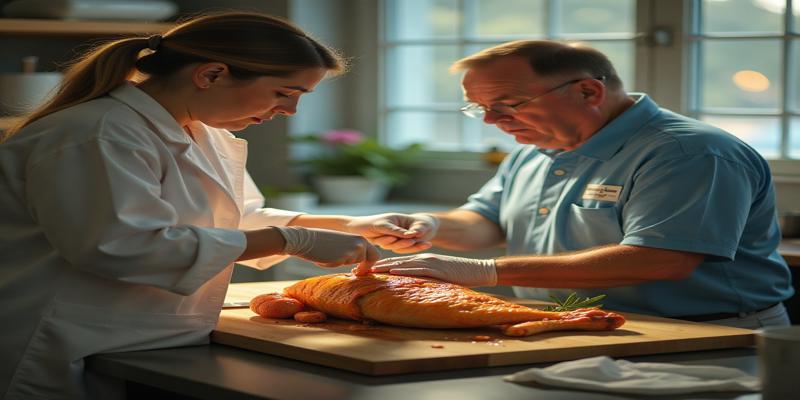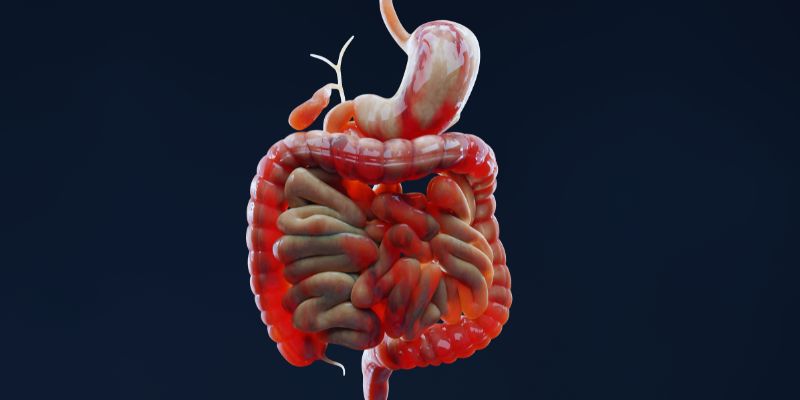With the holidays upon us, food safety should be at the top of your to-do lists as you prepare for those gatherings. Nothing puts a damper on festive cheer like food poisoning among your guests. Every year, millions of Americans become ill due to foodborne pathogens, with holiday parties topping the list of primary culprits. Proper handling, preparation, and storage of food will go a long way in lowering the risk of contamination. This guide will help you with the key knowledge to keep your holiday spread delicious and safe.
Common Food Poisoning Culprits at Holiday Parties
 Holiday gatherings are times of joy and celebration, yet they can sometimes be an excellent place for foodborne illness outbreaks. The most common culprits could help you understand how to safeguard your celebrations against the possibility of your guests receiving unwelcome food poisoning.
Holiday gatherings are times of joy and celebration, yet they can sometimes be an excellent place for foodborne illness outbreaks. The most common culprits could help you understand how to safeguard your celebrations against the possibility of your guests receiving unwelcome food poisoning.
It's Perishable Party Favorites
Many foods common during the holidays present a particular problem from a safety perspective because they can serve as ideal breeding grounds for bacteria. Examples include deviled eggs, cheese platters, and seafood appetizers. In general, it is recommended to discard perishable foods if they have been out of refrigeration for more than two hours at room temperature. If the room temperature exceeds 90°F, food should be discarded after one hour.
Undercooked Meats
The star of most holidays, whether a golden turkey, glazed ham, or prime rib roast, can be downright dangerous if not cooked right. Poultry and pork are the most risky if undercooked and may contain bacteria like Salmonella or parasites like Trichinella. Always use a meat thermometer to ensure your centerpiece dishes reach safe internal temperatures.
Cross-Contamination Dangers
In the mad scramble to prepare holiday meals, it's easy to forget about cross-contamination. Using the same cutting board for raw meats and vegetables can spread harmful bacteria and poor hand washing when handling different ingredients. Be vigilant to keep raw foods separate from ready-to-eat items and practice good hygiene throughout food preparation.
Homemade Eggnog and Other Raw Egg Delights
Traditional recipes for eggnog, Caesar dressing, and some desserts may include raw eggs, posing a Salmonella risk. To minimize risks, use pasteurized eggs or alternative cooking methods when preparing these products. If you use raw eggs, inform your guests so they can make an educated decision.
Preventing Food Poisoning at Your Holiday Gathering
 Safe Food Handling Practices
Safe Food Handling Practices
Food safety should be your top priority while hosting a holiday party. First, wash your hands with soap and water before handling food items. That itself, to a large extent, reduces the chances of contamination. Also, ensure that all cooking surfaces, utensils, and cutting boards are clean and sanitized.
Separate cutting boards and utensils should be used for raw meats, poultry, and seafood to prevent cross-contamination of ready-to-eat foods. Always cook the above items to the recommended internal temperatures using a food thermometer. For example, poultry needs to be heated to 165°F (74°C), while the internal temperature for ground meats should reach 160°F (71°C).
Temperature Control
Proper Temperature Control The key to preventing foodborne illness is adequate temperature control: Keep hot foods hot above 140°F (60°C); keep cold foods cold below 40°F (4°C). Serve hot items from chafing dishes, slow cookers, or warming trays. Keep cold items cold by nesting serving dishes in bowls of ice or serving small portions and replenishing them often from refrigerated reserves.
Proper Food Storage
After your party, refrigerate leftovers promptly in shallow containers to cool quickly. Use within 3 to 4 days or freeze for later use. When reheating leftovers, ensure they reach 165°F (74°C) throughout before serving.
Symptoms of Food Poisoning
Food poisoning can quickly turn a festive holiday gathering into a miserable experience. The sooner you recognize the symptoms, the quicker you can prevent the spread to other guests. Symptoms can vary depending on the type of contaminant; however, here are some common signs to watch out for.
Common Symptoms
The most frequent indicators of food poisoning include: Nausea and vomiting, Abdominal pain and cramps, Diarrhea-which may be watery or bloody.
The common symptoms are fever and chills, headache and muscle aches, weakness, and fatigue. They usually develop within a few hours to several days after eating contaminated food, but it may be several days before symptoms appear.
Severity and Duration
Food poisoning can be of varying degrees and duration. Mild food poisoning may subside in a day or two, but the more serious kinds may persist for over a week. Look out for symptoms that seem to stay on or worsen over time; they can be signs that medical help is necessary.
When to Seek Medical Help
While most food poisonings can be treated at home, some symptoms require immediate medical attention. They include the following: High fever (more than 101.5°F or 38.6°C), Severe abdominal pain, Bloody stools or vomit, Signs of dehydration-excessive thirst, dry mouth, dark urine, dizziness, Difficulty swallowing or breathing, Blurred vision or muscle weakness.
What to Do if Someone Gets Food Poisoning at Your Party
Recognize the Symptoms
If one of your holiday party guests develops nausea, vomiting, diarrhea, or abdominal pain in the middle of the party, they may have food poisoning. Other symptoms may include fever, headache, and muscle aches. The key is to take immediate action with kindness and the best interest of the affected individual in mind.
Provide Immediate Care
Your priority is the comfort of the ill person. Move the individual to a quiet place, away from others. Have a bucket or container ready for them to vomit. Let them rest, and do not give them solid foods or liquids until they feel better. If they can keep fluids down, give them small sips of cool, clear liquids like water, clear broth, or an oral rehydration solution like Pedialyte to replace lost fluids and electrolytes.
Seek Medical Attention if Necessary
While most cases of food poisoning resolve independently, some situations require medical intervention. Call for emergency help if the person experiences:
- Severe abdominal pain
- Bloody stools
- Signs of dehydration (extreme thirst, dry mouth, little or no urination)
- High fever (over 101.5°F)
- Symptoms lasting more than three days
Identify the Source
Try to determine which food might have caused the illness. Ask other guests if they're experiencing similar symptoms. If multiple people are affected, it could indicate a more serious outbreak. In this case, contact your local health department for guidance.
Follow Up and Prevent Future Incidents
Check on the guest's condition the next day. This is an excellent opportunity to ponder and make better adjustments for your future parties. The best attitude towards food poisoning is to do everything possible to avoid it altogether. Good practices for preparing and storing food will keep your holiday parties filled with delight without making people sick.
Conclusion
Thus, good food safety practices will go a long way in reducing the incidence of food poisoning during the holidays. Plan so that proper food preparation and storage will keep your guests healthy during your holidays together. Make food safety part of the recipe to keep your holiday party off the map.












